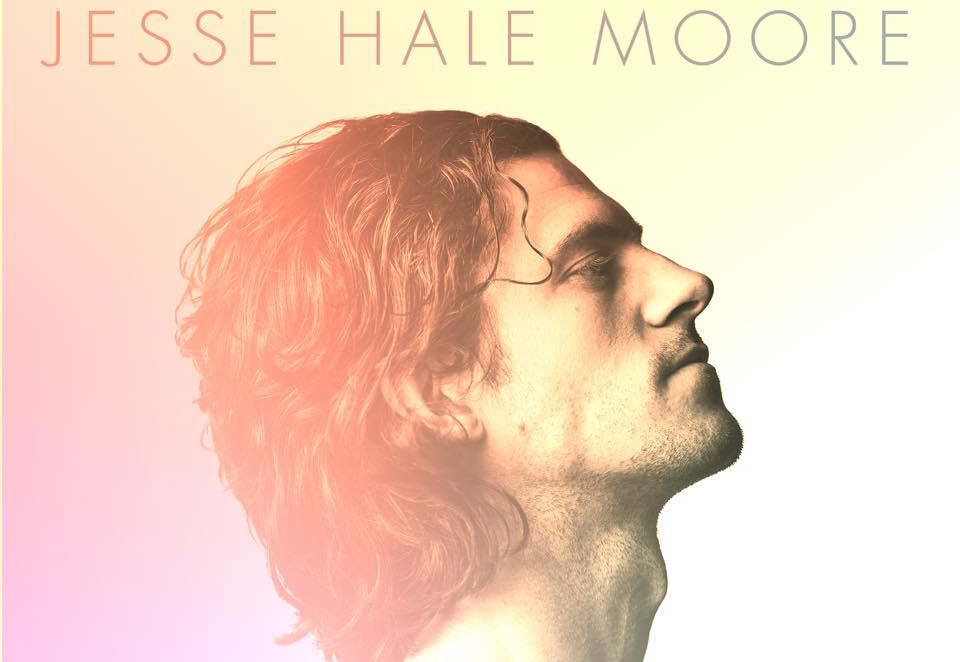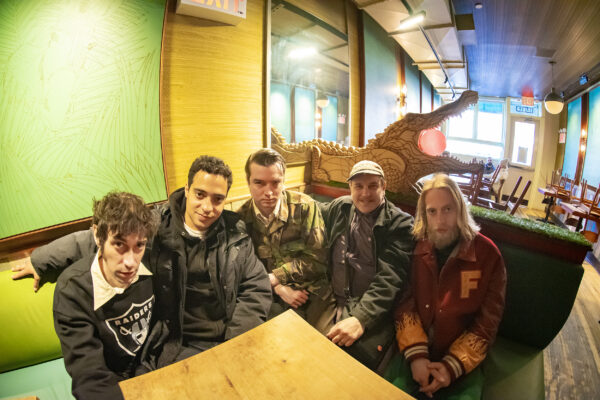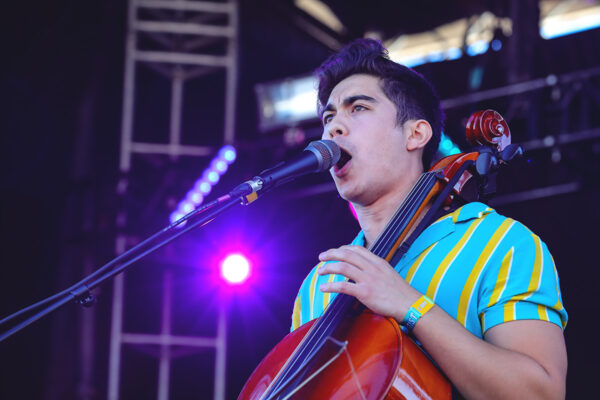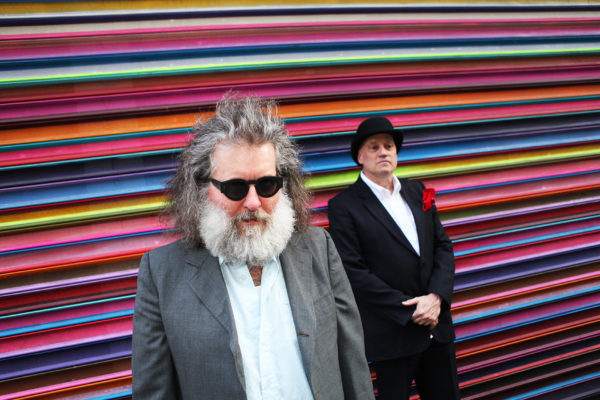Released the first week of November, Jesse Hale Moore’s debut singles “Every Time” and “Holding A Sign” each harness a softness that is sweetened by a rich, commanding vocal. Previously known to audiences through his regular performances with bands like Auctioneer, Ladies Auxiliary and Nightlands, the Philadelphia based musician had first started formal work on solo material about two years ago. Although as Moore explained to Pancakes and Whiskey in mid-November, a busy schedule had been just one of the factors that caused him to approach the project slowly.
“There was definitely this window that opened up suddenly, when a number of the bands that I was playing with kind of halted. There was just this moment where everybody was focusing their efforts on different things. I suddenly went from having three projects that I was playing on to really having none. So in that case it was definitely a timing thing, but I’ve always been drawn to so many different kinds of music and different artists who inspire me, that to be honest, when I would write music I would find myself kind of going all over the place.”
Describing his earliest songwriting efforts and how he would “write something folk inspired one day and then R and B inspired the next day,” Moore recalled having a conscious desire to carve out a concise, complete sound that would merge his tastes and strengths cohesively.
“I just recognized that I needed to mature as an artist and find my voice a little bit more. When the projects settled down and I decided I was going to focus on my solo project, I think that was the first time, and this was maybe a year and a half ago, two years ago, it was really the first time that I really diligently focused on what kind of sound I wanted to have and what kind of music I wanted to be writing. That’s where these songs came from.”
And while the classically trained musician lived in New York prior to settling in Philadelphia in 2006, his musical journey really began when he was a kid growing up on Aquidneck Island, RI. Raised in a musical family, Moore can still vividly remember becoming fascinated with the piano after watching his mother, a music teacher, practice on the instrument. Beginning lessons at an age when most can’t yet tell time, he laughed as he said, “I think it was one of my favorite toys.” Although by the age of sixteen, he had started to become more and more interested in writing his own songs.
“At that time I had started to become less interested in pursuing classical music and had been writing my own music for a few years. That’s when I stopped taking piano lessons and focused more on just exploring my own voice as a piano player and musician.”
Beginning guitar while at college, Moore spoke about the accessibility and convenience the instrument offered, before acknowledging that the shift had coincided with a period when he didn’t think that the music he had been writing on the piano was “very cool.”
“Even though I had this music that I really loved and I cared about, that I wrote, I didn’t think it was relevant and I didn’t think that it mattered. Looking back on it, it totally did and I feel like the music I’m writing now, there’s sort of this extended dialogue that’s happened between the music I’m writing now and the music that I wrote at that time. I feel like they’re very similar. But at the time, I think I had to break away from the things that I already knew. So I disengaged from the piano, I disengaged from the way that I knew how to write music and started just exploring other genres and trying to play with other people.”
In the end, his time away from the instrument had proved to be just as significant as his time with it. Joining Auctioneer as a keyboardist at a point when he didn’t even have access to a piano, the musician described how the experience had ultimately reinforced his love for his first instrument. Laughing as he said he can’t yet afford to replace the “cheap Yamaha” he purchased to use in the band, Moore can still remember the first time he ever played it.
“Honestly, when I bought it, the second that I started playing and writing on it, I was instantly reminded that that is my instrument- that’s the instrument that I write music on.”
And although he had “never stopped writing” during his time with other bands, his long held ambition of releasing his own music continued to encounter delays.
“I would definitely have these moments of, ‘If that’s what you want to do, then you have to be writing music,’ like you have to be actively writing music, you know? And see these songs through to an end point. I wasn’t finishing anything. I was always just kind of tinkering. And I think for me it was starting to get to a point where being able to say, ‘Oh I’m so actively committed to these other projects’ was almost a little bit of a scape goat because I was afraid of really digging into my own work. I think that there was still this lingering fear of like, ‘Is my point of view valid? Do I have anything to offer? What will my music sound like when I actually finish it? Will I even like it?’ And it freaked me out.”
Postponing solo work until he felt ready to fully commit to the demands and challenges of the process, the timing had finally felt right when those other projects began to slow down. Encouraged by his friend and Nightlands bandmate/bassist in The War On Drugs, Dave Hartley, Moore began recording his own original material.
Discussing Hartley’s role as producer, the musician said that they both share the desire to take creative risks by “always trying to push the envelope further, trying to push the sound.”
“I think we’re maybe similar in terms of our expectations of how we work. I would say that for better or for worse, I have a hard time if things don’t just instantly come together. I always am chasing that creative moment where everything is just happening and it’s fun and easy. I’ve definitely learned through the recording process that it’s hard. It’s really hard to carve out the sounds that you want. Having Dave there to kind of help to guide that was so crucial because he’s such an experienced musician.”
Discussing the importance of maintaining a “live band sound,” Moore described his specific influences and goals for production.
“When we first started talking about the sound, my sort of vague description of what I wanted was really like, ‘I want to have the kind of cool tones that are associated with R and B music, but with the warmth of a rock and roll band.’ And that was really something that I wanted. I wanted the music to sound like it was performed by live musicians. That being said, I always love having weird, synthetic sounds in there. I love unusual synth, analogue textures.”
Already back to work recording new music, he plans to make his full-length debut sometime in the near future. Until then, his music can be heard in venues across New York and Philadelphia, where he frequently performs. Although out of all the songs that comprise his sets, “Every Time” and “Holding A Sign” are sure to hold particular meaning to the musician. The first songs he had finished writing once he began the project, Moore spoke fondly about how their very completion had marked a turning point by inspiring him to officially launch his career.
“That was the first time that I just felt really good about something I’d finished. I think for me, it was sort of this moment of, ‘I think this is my sound, I think these might be the songs that I start my career with.’ There was just sort of this clarity that came from finishing them. I felt like I wanted to share them. I wanted to bring them out into the world in some way.”
Stay Tuned For New Music From Jesse Hale Moore and don’t Miss His Set At Boot and Saddle in Philadelphia on 12/1 (tonight)!
Article: Caitlin Phillips




